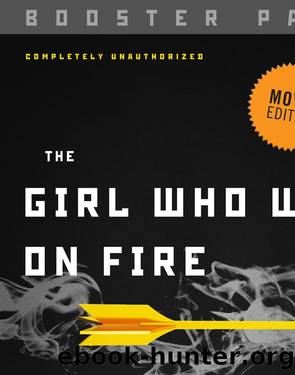The Girl Who Was on Fire - Booster Pack by Leah Wilson

Author:Leah Wilson
Language: eng
Format: epub
Tags: Pop Culture
ISBN: 9781936661602
Publisher: BenBella Books, Inc.
Published: 2012-01-04T16:00:00+00:00
No, the Book Doesnât SuckâItâs a Bold, Artistically Risky Work with a Classic Theme
We all agree that Mockingjay is very different than The Hunger Games and Catching Fire. The question is why.
The answer is: because Collins took a bold, artistic risk. We expected a rousing conclusion to an action-oriented trilogy; instead, we got a moral parable and moody, introspective character study.
The book starts from a simple premise: What would really happen if Katniss had actually gone through all those events? The result would be very different than in the fantasy worlds of Star Wars, Lord of the Rings, or even Harry Potter. The psychological consequences would be far more profound.
When you look at the book this way, a lot of the âcriticismsâ I cited above seem like very deliberate choices on the part of the author.
Why isnât Katniss in the room when Peeta is being deprogrammed? Because heâd claw her eyes out! Heâs been programmed to hate her, after all.
Why isnât she the one who figures out a way to reach him? That has to do with the whole point of the books: Katniss is powerless in the grip of forces beyond her control. She may have outwitted Snow and the Capitol in The Hunger Games and Catching Fire (with a little help from allies), but her luck has finally run out.
Why does so much of the story revolve around her, and why do so many of the characters obsess over her? Here Collins is definitely making an ironic point: the power of the Mockingjay is an illusion; Katniss is a propaganda figure to be manipulated by both sides. The only real power she has is the power we all have: the power of the individual.
Does Katniss have to spend the first two-thirds of the book being thwarted at every turn? Damn straight. First, thatâs the only way to break the pattern of the first two books and truly emphasize to the reader just how powerless she isâthat this time there is no way out, no last-minute reprieve.
Second, Katniss herself needs to come to terms with the true hollowness of her status as the Mockingjay. Sheâs important in name only. But this gradual realization leads directly to the bookâs single most important event: her decision to kill Coin instead of Snow.
The Mockingjay may be a dead end, but the individual, acting with a good heart at a key moment, can still change the world.
Is the book too âsmall,â too claustrophobic? Well, itâs intimate, but thatâs not the same thing as small. We do spend much of the book inside Katnissâ head, but thatâs only because the Hunger Games have pushed her deeper and deeper into herself.
Post-Traumatic Stress Disorder? You bet!
In chapter twenty-three, Katniss overhears a conversation between Peeta and Gale, in which Gale speaks about the choice sheâll make between the two of them: âKatniss will pick whoever she thinks she canât survive without,â he says.
âThereâs not the least indication that love, or desire, or even compatibility will sway me,â Katniss tells us, thinking on this in the next chapter.
Download
This site does not store any files on its server. We only index and link to content provided by other sites. Please contact the content providers to delete copyright contents if any and email us, we'll remove relevant links or contents immediately.
Machine Learning at Scale with H2O by Gregory Keys | David Whiting(4289)
Never by Ken Follett(3930)
Harry Potter: The Complete Collection by J. K. Rowling(3554)
Fairy Tale by Stephen King(3366)
Oathbringer (The Stormlight Archive, Book 3) by Brandon Sanderson(3126)
Harry Potter and the Prisoner of Azkaban by Rowling J K(3124)
Harry Potter and the Order of the Phoenix by Rowling J K(3080)
Reminders of Him: A Novel by Colleen Hoover(3072)
Harry Potter and the Chamber of Secrets by Rowling J K(2991)
Will by Will Smith(2904)
Harry Potter 3 - Harry Potter And The Prisoner of Azkaban by J.K. Rowling(2885)
The Inheritance Games by Jennifer Lynn Barnes(2846)
Once Upon a Broken Heart by Stephanie Garber(2840)
The Hogwarts Library Collection by J K Rowling(2827)
Harry Potter 7 - Harry Potter and the Deathly Hallows by J. K. Rowling & Mary Grandpré(2731)
The Tales of Beedle the Bard by J.k.rowling (eng)(2722)
Harry Potter and the Deathly Hallows by unknow(2680)
A Journey Through Care of Magical Creatures by Pottermore Publishing(2654)
The Crown of Gilded Bones (Blood And Ash Series Book 3) by Jennifer L. Armentrout(2654)
